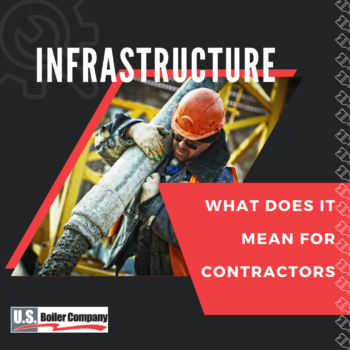By: Allie Perez
Over the last few months, the term “infrastructure” has been thrown around by politicians and the media. By definition, infrastructure means the “basic physical and organizational structures and facilities needed for operation of a society or enterprise.”
Most can agree that the United States needs to invest in our roads, buildings and energy infrastructure improvements. The Infrastructure Bill will supply plenty of funds and resources for improving bridges, piping systems and electric wiring. This seems like a win-win for the construction industry. Once it’s broken down, however, it becomes apparent that there are both challenges and benefits to the new Infrastructure Bill.
Setting the Stage – the Infrastructure Bill is not the only bill in the works.
- American Rescue Plan passed earlier this year – 1.9 trillion – related to health coverage and provides 100% federal continuation of health coverage (COBRA) through September 1, 2021.
- Infrastructure Plan approved by Congress – 1.2 trillion – related to improvements to roads, bridges, ports, rails, water, power grids, broadband and more.
- Build Back Better Plan – passed the House early December – 1.75 trillion – related to funding pandemic relief, social services, climate change and infrastructure.
The highlight of this article is the Infrastructure Bill, the following benefits and challenges related specifically to the Infrastructure Bill.
The benefits of the Infrastructure Bill are numerous, but what exactly are the pros of the bill…
- The Infrastructure Bill will increase workers, 2 million jobs per year. This job growth plan will have decade long affects. The Infrastructure Bill is highly supportive of unions. Small business can benefit as well.
- Upgrading the nation’s infrastructure (roads, bridges, pipe, electric wiring) to the tune of $550 billion to “commodity-intensive infrastructure projects.” Twenty percent or 110 billion dollars are allocated for road and bridge construction.
- Federal projects need local contractors. This translates to bids and jobs for small business and contractors.
- Signal to young workers that our industry is booming and economy safe. Most contractors did not stop working during the pandemic and were considered “essential workers.”
- Federal dollars for community improvement translates to easier and more efficient commutes to work. When transportation options and routes are plentiful, workers can work. Better roads and less traffic also means more service calls in a single day.
- Stabilize the supply chain by improving transportation and ports.
The Infrastructure Bill also has some drawbacks for small business and contractors.
- There will be a lag from the bill passing to getting federal contracts out for bid. It could take several years for federal projects to be available to contractors for bidding.
- Everyone is impacted, maybe not directly, but through the ripple of such a large infrastructure plan that will affect everyone in the United States.
- Not as “bipartisan” as the bill title claims; the reconciliation budget will be written completely by the Dems. The Democratic Party has already stated they will focus on environmental effects, which is a good for all.
- Skilled labor is already experiencing a shortage. As need increases, so will the need for skilled labor. According to the US Chamber of Commerce, 88% of commercial construction contractors reported difficulty finding skilled workers, even going so far as to turn down projects and bids. As an industry, the skilled trades need to replace aging out workers AND plan for growth.
- With limited supplies, this will further strain the supply pipeline until the infrastructure fixes it. Contractors and homeowners will be competing for the same goods. This is far from ideal.
As a small business or contractor, here’s how to prepare for the effects of the Infrastructure Bill:
- Discuss as a team and craft a plan; prognosticate direct affects to your company
- Evaluate your core values and consider the socioeconomic impact of the bill
- Stay up to date on the latest news from a reliable source. As the bill moves through to implementation, announcements will be made to alert the public of progress. As a small business owner or contractor, stay in tune with these announcements to be ready for the federal project bidding timelines.
The Infrastructure Bill is chock-full of difficult language to decipher. Hopefully, this article helps to clarify the differences in the bills, the benefits, the challenges and the best way to prepare for the future. Ideally, all of this infrastructure hype will help feed the skilled trades industry the workers that we so desperately need.
# # #
Allie Perez is the CMO/COO of George Plumbing Company, Founder of Texas Women in Trades and San Antonio Women in Trades. She serves on the City of San Antonio Small Business Advisory Committee as the Mayor’s Appointee. She is a graduate of New York University and has written for trades periodicals for over a decade.

